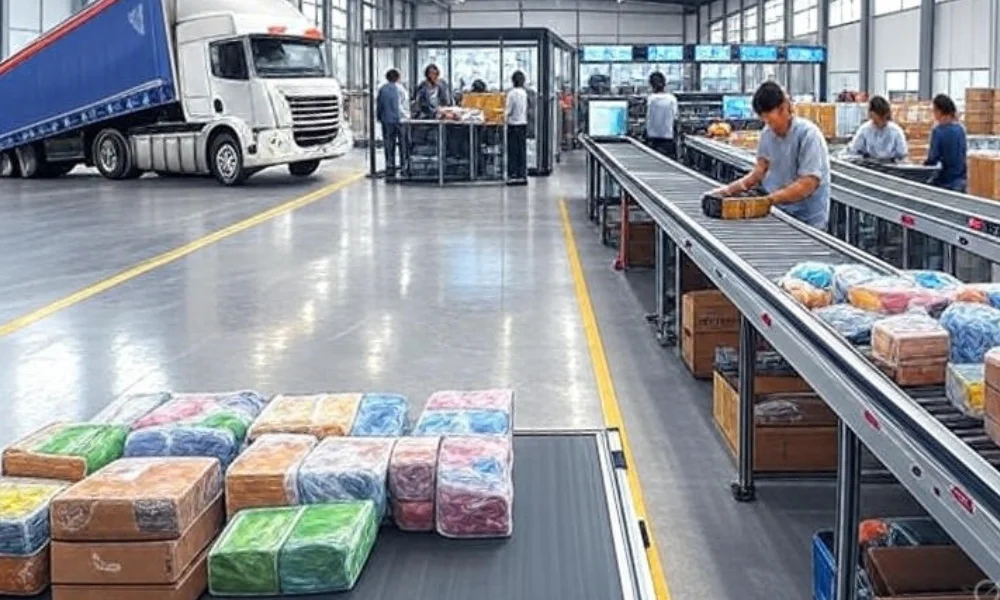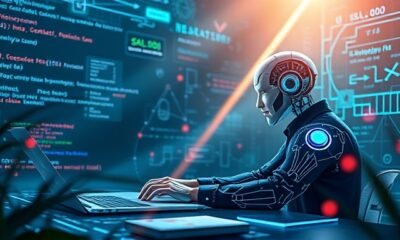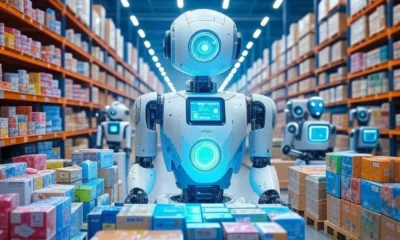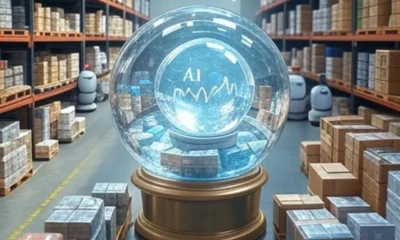Artificial Intelligence
Why Returns Matter More Than Ever
AI is transforming returns and reverse logistics by making them faster, smarter, and more sustainable. Businesses save costs, detect fraud, and keep customers happy with better return experiences.

I am no stranger to this when I ordered shoes online and the pair delivered was the wrong size just in my face. I can recall the feeling of reading a vague return policy and waiting weeks to find out that I would get a reimbursement but little by way of actual insight. That is why the issue of returns is more significant than ever as one negative experience can make me change the brand just then and there.
Definition:
I consider reverse logistics to be the transportation of commodities backwards in the vicinity of the customers towards either returns, repairs or recycling.
I am aware that reverse logistics is an expensive procedure that also consumes a lot of time to the firms and poor customer returns experience can destroy trust and loyalty in a short time. It is why I think that AI in returns and reverse logistics is more than an upgrade of a technology but a game changer on both ends of the fence. Within this article, I aim to demonstrate how AI enhances the rate of refunds, increases transparency, personalizes the returns processes, and minimizes waste in such a way that enables smarter returns to become an actual competitive edge.
What is Reverse Logistics and Why Does it Have Customer Experience Problems?
My understanding of reverse logistics is how a given product moves back to the seller once it is purchased by the customer. I am aware that this process includes returns, repair, refurbishment and recycling that can be easily complex on the part of the customers and businesses. When I have a bad experience with the returns process then I think twice before I shop with the brand once again.
I have observed that issues relating to refund processing time which causes significant delays, as well as the lack of clarity of the returns policy, are the greatest areas of pain among the customers. My hypothesis is that s-l-o-w communication and lack of visibility in the status of the returns tend to make the customers feel neglected and unworthy. My patience runs out often when I am waiting and have no means of knowing when my coming back is going on.
As a consumer, these problems in returning cause distrust to me and I develop an unwillingness to shop in the same store again. I also observe business entities lose money as the experience of returns drives off the customers to other companies whose treatment of returns is more satisfactory. My take on reverse logistics is that the issues attributed to reverse logistics besides being an operational issue also present a grave threat to customer loyalty.
What are some of the ways to have AI approve returns and detect fraud?
Checking eligibility of returns using details including order and product conditions against policy rules to know if they are eligible, is done instantly, rather than the time delays with manual processes. This has significantly reduced the speed of my returns process and assists me in getting refunds or exchanges much faster as compared to the past.
I am aware that AI-based systems are able to discover fraud by finding unusual patterns such as frequent returns of valuable items or poorly coordinated purchase history. Such systems maintain my returns at a reasonable level and prevent misuse of the procedures that ensure I am honest customers.
When a brand incorporates this into AI, I find that there are less processing problems and hassles all around. Such efficiency is one of the factors that make me return to take a product because I appreciate a business that does not waste my time.
What does the AI allow in terms of smarter returned items routing?
I will use AI to determine the most appropriate location where I deliver my returned products be it a shop, warehouse, or repair center. Product type, condition and location are checked then a combination of the quickest and the most economically viable route is chosen every time by the system. I can understand how this can avoid any expense in shipping and will have my refund or replacement at a much quicker rate.
In my view, smart routing would help to save businesses money, as well as to minimize delays and the transportation that is actually unnecessary. It also allows to establish a more positive customer experience as overall, I resolve my returns in a quicker and less stressful manner. I think that this is one of the most evident mechanisms by which AI makes the reverse logistics more intelligent.
What can AI do to provide real time tracking and visibility to customers?
I absolutely adore when AI-controlled systems indicate me the very location of my refund and the time when it is going to be returned to me. Such tools tie the shipping information, warehouse information, and the processing schedules into a single easy-to-read view so that I can consult it at any time. This leaves me well informed and in control of the entire process of the returns.
Transparency, as I see it, will create trust between me and the brand, and this will influence me to visit the brand to shop again.
How can personalization increase returns with AI?
I like it when AI adapts the returns policy to my act of purchasing and past/historical relationship with that brand. Such personalization will make the process less difficult and will keep me more interested in the store.
It is also possible to suggest exchanges over refund by making suggestions to similar products or a better fit to my previous purchases with the help of AI. It makes a potentially dissatisfying situation a pleasant shopping experience.
How I see it is that personalization gives a human nature to what may otherwise amount to a frustrating process. It demonstrates to me that the company appreciates my connection and it is ready to make my going back experience as simple as possible. That increases the probability that I will go shopping there once again.
What are the ways that AI minimizes its impact on the environment? in reverse logistics?
AI also sends the repair work to nearby refurbishment center or sells the products rather than transporting them to a far off state. I can go ahead and visualize how this is more fuel-saving, cost-effective and does not waste products. This strategy predisposes me to a higher chance of returning products without having to feel guilty of destroying the earth.
In my opinion, the AI-based eco-friendly routing approach will grow closer to the environmentally responsible customers, such as me. I buy a product and feel happy whenever I see a brand that is concerned with sustainability and I have the motivation to continue purchasing its products even in the future.
Measuring improvement of customer experience:
Test I have installed to determine the extent of success of a returns process is the swiftness of my refund following a shipment of a returned item. The speed is important to me as spending weeks waiting is what makes the process feel frustrating even in case everything goes right. AI allows companies to reduce this period and it has a direct effect of making me happy.
Another aspect through which I pay attention is the way a company communicates in the returns process. In case of frequent updates and correct timelines, I am more confident about the brand. This comes with the use of AI powered tracking systems that minimize follow up by me. Being accurate and consistent, AI spares both the customers and businesses of undesirable stress. This increases my chances of shopping with the brand by far.
Real-world examples of AI in reverse logistics:
I have witnessed how AI has been applied by large retailers such as Amazon in approving returns in real time, something that has made the refund process occur much quicker to a customer like myself. This swiftness makes the shoppers satisfied and does not drive them to other online stores which retain customers better. It also saves the customer service personnel.
I heard that some of the third-party logistics providers apply AI and can forward returned products to the most favorable processing center. This implies refurbishment, resale or recycling of products without wasting them in warehouses. Such efficiency is useful to both the company and the client.
Startups are also involved, as they develop AI that analyses the images of the products and checks the returns whether someone can get them or not within several seconds. Such inventions make the reversal procedure simpler and much more operational, creating customer devotion and confidence in the long run.
Some of the pitfalls and strategic thought relating to AI in returns:
I am also aware that AI requires wholesome and precise data to make good decisions concerning returns. When data is dirty or incomplete, the outcomes may annoy both the customers and employees. I think that data quality investment on an early stage makes the entire process more credible.
Other issue that I foresee is maintaining a human touch in the proceeding. Maintaining a perfect balance between automation and human service ensures that customers such as me will feel appreciated.
What does the future hold for AI in reverse logistics?
In my opinion, in the nearest future, AI will help to predict the most probable returns so that even before an order is sent, one can know what is likely to come back. This would enable me to get improved product recommendations on the basis of my needs and avoid taking unnecessary items back. This would save time, and waste.
I can also expect the spread of virtual try-on technology, with which I can visualize how the items will appear or fit. It will ensure that I am more certain in what I want and less likely to experience disappointment following delivery. This would make returns quicker, cheaper and greener with all customers including me kept in the know at all times.
Conclusion:
I think reverse logistics changed using AI and returns became expedited, more transparent, and more customer-centered, even to a guy like me. By utilizing the AI in smartening of returns, when a brand does so, I detect the difference in the speed of the refund, the ease of communication and its general convenience. That makes me more trusted and want to shop there again.
I also observe that AI can help businesses cut their expenses even as they enhance the experience of their customers. Accurate tracking, faster approvals and personalized service makes the one time frustrating process a loyalty driver. I am aware of this being a type of growth that every business ought to pursue. Provided you are interested in making customers happy and being more efficient, then AI in returns is something to investigate today. Earlier, the faster, the more the companies will gain trust and become visible on the competitive market. Do you think these notions could work to help you improve on your own process of returning?
-

 Artificial Intelligence8 months ago
Artificial Intelligence8 months agoHow to Use Grok AI: A Complete Guide
-

 Artificial Intelligence10 months ago
Artificial Intelligence10 months agoWhat is Artificial Intelligence? A Comprehensive Guide for Businesses and Enthusiasts
-

 Artificial Intelligence9 months ago
Artificial Intelligence9 months agoUnlocking the Power of Artificial Intelligence Tools
-

 Artificial Intelligence9 months ago
Artificial Intelligence9 months agoWhat is DeepSeek? Revolutionizing AI with Cutting-Edge Solutions
-

 Artificial Intelligence5 months ago
Artificial Intelligence5 months agoAI Technologies in Warehouse Automation:
-

 Artificial Intelligence5 months ago
Artificial Intelligence5 months agoPredictive Analytics for Demand Forecasting:
-

 Artificial Intelligence6 months ago
Artificial Intelligence6 months agoMeta’s AI Push: The Standalone Assistant App Set to Rival ChatGPT
-

 Artificial Intelligence5 months ago
Artificial Intelligence5 months agoHow Artificial Intelligence is Revolutionizing Logistics:


